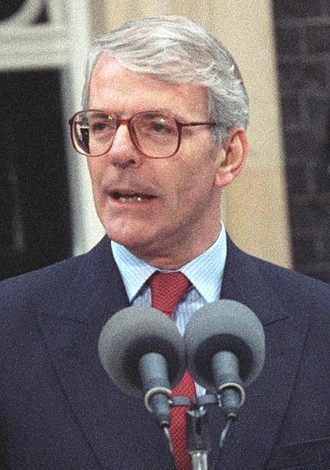John Major

Sir John Major KG CH (born 29 March 1943) is a British politician who served as Prime Minister of the United Kingdom and Leader of the Conservative Party from 1990 to 1997. Major served in the Thatcher government from 1987 to 1990 as Chancellor of the Exchequer and Foreign Secretary, and was Member of Parliament (MP) for Huntingdon, formerly Huntingdonshire, from 1979 to 2001.
Major was born in St Helier, London. Leaving school in 1959 with just three O-levels, after working a variety of jobs and enduring a period of unemployment, Major established a career at Standard Bank. He was elected as a councillor in Lambeth, and was later an MP at the 1979 general election. He initially served as a parliamentary private secretary and an assistant whip before joining the government as a minister. After the 1987 election, he was promoted to the Cabinet by Margaret Thatcher as Chief Secretary to the Treasury. He was later moved to become foreign secretary in July 1989, before becoming chancellor of the Exchequer just three months later after Nigel Lawson’s abrupt resignation. As chancellor, he presented the 1990 Budget, the first to be aired on television.
In November 1990, after Thatcher resigned following a challenge to her leadership by Michael Heseltine, Major entered the second stage of the contest and emerged victorious; he was appointed prime minister on 28 November. In his first months in office, he launched the Citizen’s Charter, replaced the unpopular Community Charge (known as the “poll tax”) with Council Tax, committed British troops to the Gulf War, and negotiated the European Union’s Maastricht Treaty.[1] Despite a severe recession, Major went on to lead the Conservative Party to a fourth consecutive electoral victory at the 1992 election, winning over 14 million votes, which remains to this day a record for a British political party, although with a reduced majority in the House of Commons. Just months later, Major was forced to withdraw the pound sterling from the European Exchange Rate Mechanism (ERM) on 16 September 1992, a day which came to be known as Black Wednesday. This led to a loss of confidence in Major’s economic credibility, and he was never again able to achieve a lead in opinion polls. Despite a dwindling majority, Major passed further reforms to education and criminal justice, privatised British Rail and the coal industry, and signed the Downing Street Declaration, reinvigorating the Northern Ireland peace process, which would eventually help lead to the Good Friday Agreement.
By 1995, splits over EU policy and the loss of numerous MPs to a series of sexual and financial scandals (widely known as “sleaze”) led Major to resign as party leader in June, challenging his critics to either back him or challenge him; he was duly challenged by John Redwood but was easily re-elected. This did not lead to an improvement in his political standing, and by December 1996, the Government had lost its majority in the House of Commons.[2] At the 1997 election, after the Conservatives had been in power for 18 years, Major lost to Tony Blair’s Labour Party in one of the largest electoral defeats since the 1832 Great Reform Act. Major resigned as Leader of the Conservative Party following the defeat and was succeeded by William Hague.
Major retired from the House of Commons at the 2001 election, and has since pursued his interests in business and charity. While early assessments of his time in office saw him characterised as being a weak and unassertive leader, a reappraisal in following years saw many note his successes in the Northern Irish peace process, restoring economic growth, reforming the public sector, boosting the profile of arts and sports, and preserving British influence on the international stage.[nb 1] Since Thatcher’s death in 2013, he has been both the oldest and earliest-serving of all the UK’s living former prime ministers.
